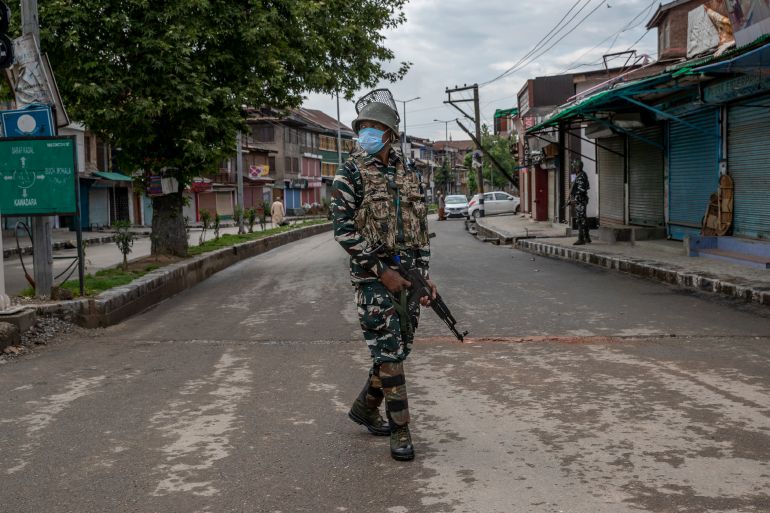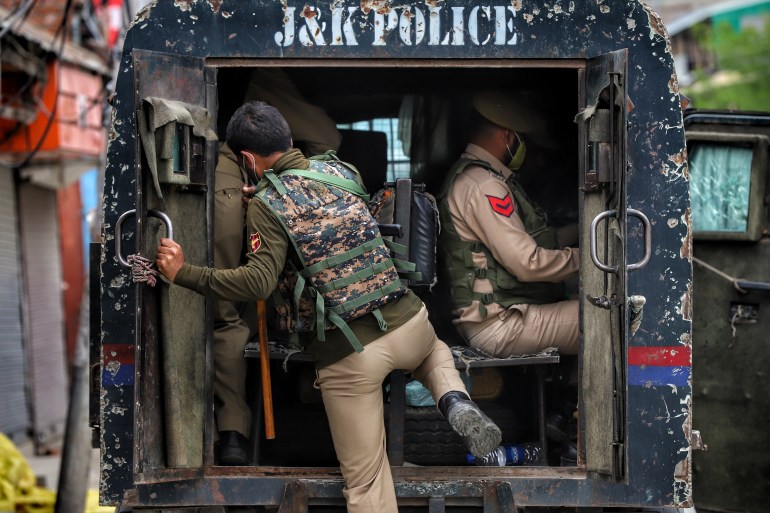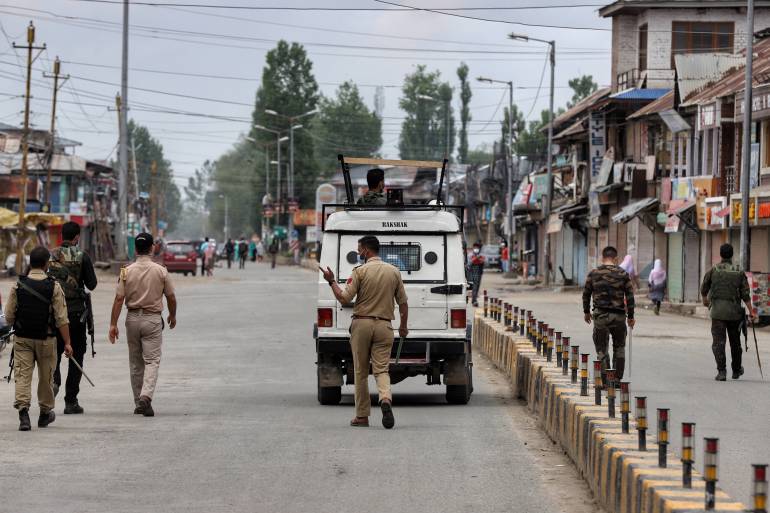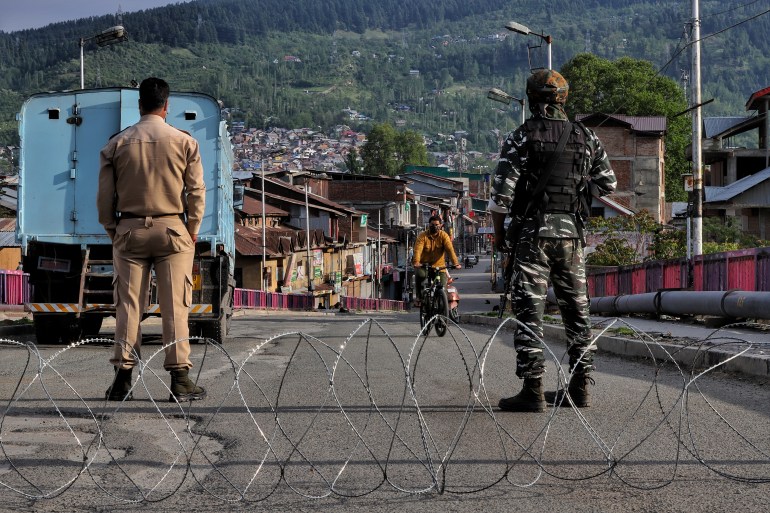India sacks Kashmir employees for threatening ‘security of state’
Three workers dismissed from services after government implements a series of new laws aimed at stemming ‘anti-India’ sentiment.

Srinagar, Indian-administered Kashmir – On May 1, the day the world marks as International Labour Day, Idrees Jan was summoned to the magistrate’s office in Indian-administered Kashmir’s Kupwara district and handed an envelope.
The envelope contained an order that left the 39-year-old stunned – he had been sacked from his job as a teacher in a government school.
Keep reading
list of 4 itemsIndian state braces for Tauktae, ‘most severe’ cyclone in decades
Top India scientist quits COVID panel over differences with gov’t
India’s political prisoners in bad health, lose family amid COVID
Jan is the first among three Kashmiri employees to have been terminated this month by the disputed region’s chief administrator, handpicked by New Delhi, after the government implemented a series of new laws aimed at stemming “anti-India” sentiment.
Two days after Jan was sacked, two others – Dr Abdul Bari, an assistant professor of geography from Kulgam district, and revenue officer Nazir Ahmad Wani from Pulwama – were also dismissed from their jobs. Both of these men are already in jail.
Their sacking is part of a crackdown on dissent launched by India’s Hindu nationalist federal government after it scrapped the special status of the country’s only Muslim-majority region in 2019 and turned it into a federally governed territory.

Jan’s dismissal order noted that it has been done “in the interest of the security of the state” and that “it is not expedient to hold an inquiry” into it.
“I was handed over an envelope in the presence of police and was told to open it,” Jan told Al Jazeera, adding that soldiers had cordoned off his house on the day of dismissal.
“I should have been given a chance to put my side of the story. There was no inquiry, no time was given to me,” said Jan.
‘How can I be a threat?’
During a mass civilian uprising in Indian-administered Kashmir in 2016 against the killing of a young rebel commander Burhan Wani, Jan was arrested for throwing stones at the security forces and booked under the stringent Public Safety Act (PSA), a law that authorises detention without trial for up to one year.
He was released four months later after a local court quashed his PSA, he said.
“After that incident, I have been working normally. I have been busy with teaching my students,” he said. “I am a small teacher, how can I be a threat to a big country?”
Jan, who has twin daughters and a son, had been in service for the past 15 years. “I am respected in society because I groomed students. Some are doctors, engineers and most of them have good posts. I am only capable of teaching, I don’t know what I will do, now.”
He said his family is in great shock, “as if everything has been taken away from us”.
“This is unfair and harsh towards me. There should have been inquiry and I should have been suspended till there was anything proven against me,” he said.
“I do not know how to feed my family in the pandemic. Today, it happened to me. Tomorrow it can be done with thousands of others in Kashmir.”
‘Severe in nature’
Last month, the regional administration ordered the formation of a special task force to scrutinise the cases of employees “suspected of activities” that required action under Article 311 – a legal provision that deals with “dismissal, removal or reduction in rank of persons employed in civil capacities under the Union or a State” after holding an inquiry against them.

While the law gives “reasonable opportunity of being heard in respect of those charges” to the suspect employees, one of its sections, which has been invoked by the administration, bypasses the condition of inquiry if “the president or the governor … is satisfied that in the interest of the security of the State, it is not expedient to hold such inquiry”.
An official concerned with the development told Al Jazeera, on condition of anonymity, that while there is a provision for minor and major penalties, the cases being recommended by the task force are “severe in nature”.
“There are some people who try to bring disruption in the society. So these people are being identified with strong evidence. After sufficient evidence, their cases are recommended for termination,” the official said, adding that “there [is] acute misconduct evidence against them”.
“There are many more officials who will be dismissed for their conduct over the years. This is a message to the government employees who, despite being part of the government machinery, indulge in activities prejudicial to the security of the state,” the official said.
‘He is being targeted’
At his home in southern Kashmir’s Kulgam, geography professor Bari’s family is clueless. He was arrested two months ago in a case that dates back to 2018, his brother Rouf Naik, who is also a lawyer, told Al Jazeera.
Until then, Naik said, his brother was attending to his duties normally at the college.
“He was doing his job properly till July 30 last year in his home district. Then he was transferred to Udhampur in Jammu which we believe was a punishment posting away from home,” he told Al Jazeera.
On March 7, Bari was delivering a lecture to his students when police raided the college and arrested him.
Bari’s family said he was a social activist and would speak out against corruption in the administration, which they claim could be a reason for the termination of his job.
“Once he raised voice against the army’s illegal occupation of land near his hometown. He has four cases against him but he has not been proven guilty of anything yet. He was targeted just for his activism and raising his voice,” Naik said.
“His wife and a two-year-old baby are emotionally traumatised that he has lost his job and is being targeted like this.”

Nearly 30km (19 miles) away, revenue officer Wani’s wife and three children are equally disturbed by his sudden dismissal.
Wani was arrested for “providing logistic support to the militants” after police raided a shop owned by him and claimed they had busted a rebel hideout at his house and recovered some weapons – allegations his family reject.
“My father has always stood for the country. He was honest and used to do his work honestly. The whole village is witness to that, he is being targeted,” Wani’s 18-year-old son told Al Jazeera. “This is unjust.”
Religious bias
Ghulam Nabi Shaheen, spokesman for the Jammu and Kashmir Bar Association, a local body of lawyers, termed the terminations “illegal and unconstitutional”.
Shaheen said while the law allows the government to dismiss employees under Section 311 without holding an inquiry, this is only in the event that an inquiry becoming public could threaten national security.
“But here they say (these) people already have cases in courts and those allegations are already in the public domain. The material is already in the public domain. So, this is illegal and unconstitutional,” he told Al Jazeera, calling the dismissals “politically motivated”.
“The allegations that are already in the public domain cannot cause a threat to security,” Shaheen told Al Jazeera.
In a statement, Rafique Rather, president of the region’s Employees Joint Action Committee (EJAC), called the termination of the three government employees “sheer injustice”.
“The termination of government employees from their services without giving them a chance to be heard is against the spirit of law. The move has sent shivers across employees fraternity who are already stressed and overburdened while working in extremely adverse working conditions,” the statement said.
Pro-India politicians in the region also condemned the sackings, with the National Conference party chief Farooq Abdullah saying the move will “further push people towards alienation”.
Mehbooba Mufti, the former chief minister of the region, termed the grounds for termination “flimsy”.
“In the middle of a pandemic, the (government of India) should focus on saving lives instead of firing government employees.”